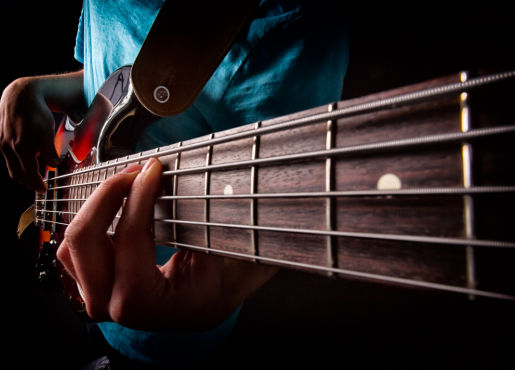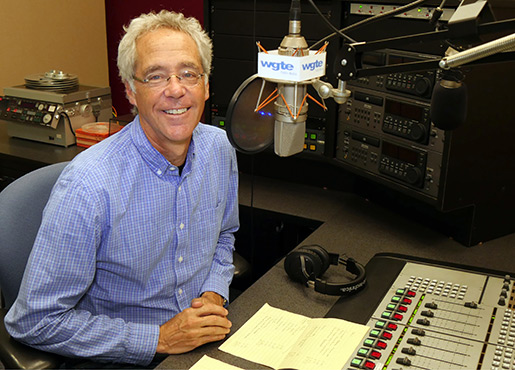
The Face of Bass
By Fritz Byers
Twenty-five or so years ago, I spent several hours across several days talking with the bassist Clifford Murphy, a revered and much-missed Toledo treasure. At the time, I was writing a regular jazz column for The City Paper; that month I’d set out to write about another local legend, the pianist Claude Black. For characteristically odd and hilarious reasons, Claude eventually asked that I not publish my piece on him, leaving me scrambling with a deadline approaching. I moved my eyes across the bandstand to Clifford, who was, of course, gracious, funny, fascinating, and highly patient.

I remember the feeling as I talked with Clifford that I was, at last, coming to understand the complexity of the bassist’s role, in music generally and in the irreducible genre of the piano trio. Part of the rhythm section, paired with the drummer, sure; but also an indispensable part of the harmony section, tied unavoidably to the pianist. This is obvious, I suppose, to anyone who understands how music, and especially improvised jazz, is made. But for an avid but untrained listener, this counted as revelation.
Thank you, Clifford, for that, and for everything else you brought to Toledo’s jazz community over your many decades of stalwart playing and unflagging decency.
I’ve been thinking about these things during my latest immersion in the music of the pianist Bill Evans. I’ve no doubt that I’ve listened to his music for more hours than that of any other musician, and each time with a deepening appreciation. It’s not an exaggeration to say I’ve listened to the live 1961 recordings of Bill’s trio at the Village Vanguard hundreds upon hundreds of times. But just this past Sunday, I heard something in Scott LaFaro’s bass line on the trio’s third performance his composition “Gloria’s Step” that had the quality of a first sighting of a New World.
(The second performance, which opened Set 1 that evening in June 1961, was long available on the initial issue of the live recordings. And the first effort, during the afternoon set that day, was interrupted. This third version was finally released as a bonus track on the CD reissue and is part of the Complete Village Vanguard Recordings, released in 2005.)
Scott’s diversion on this take expands his role into melodist, inventing new lead lines on his own established tune, and I can but marvel at the lightning-flash brilliance required to be, at once, at the vortex of rhythmic, harmonic and melodic improvisation, on-stage, in-performance, in front of one of jazz’s most exacting crowds. If anything, we’ve underappreciated Scott LaFaro, who died in a car accident ten days after this fabled live performance. (I commend to you the biography, Jade Visions, written by his sister, Helene LaFaro-Fernandez.)
Bill Evans kept going, of course, which got me thinking about the extraordinary series of bassists who abetted his music. Chuck Israels followed Scott – what a daunting challenge! The two 1962 studio recordings of the trio – Moon Beams and How My Heart Sings! -- with Paul Motian steadily on drums, are often passed over, but they’re wonderful. The treatment of “Summertime,” on the latter, is a virtuosic display of the swing and rhythmic drive of Bill’s trio, which is often missed because of the sheer, often lilting beauty of the music
Gary Peacock is the bassist on Trio ’64, which was Paul’s last date in the drum chair, and the only recording Gary made with Bill, at least to my knowledge. I’ve spent time in Alternate Universe fantasyland, wondering what would have happened if Gary had stuck around. But then, what he went on to do in other settings is so bountiful and engaging that thinking about this feels like a pointless indulgence.
Then Eddie Gomez, from 1966 through late 1977. Paired with the drummer Jack DeJohnette, this iteration of Bill’s trio is, for some, the greatest. (Others consider this a heresy.) This trio produced the wonderful live 1968 recording at the Montreaux Jazz Festival. And recently, the intrepid folks at Resonance Records have granted us a series of other live recordings of this trio – Another Time: The Hilversum Concert, and Live at Art D’Lugoff’s Top of the Gate, among them.
And Bill’s last regular bassist was Marc Johnson, who began with Bill in the Fall of 1978. To my ears, Marc has more in common with Scott LaFaro, as an accompanist and as an innovative leading voice, than any of the others. Bill passed in September 1980, aged 51, so we have only two years of their work together. But the two Editions of The Paris Concert, recorded in November 1979, suggest that thrilling music was ahead.
Even after all these years of devoted listening, it’s hard for me to get past Bill’s immaculate touch and nonpareil harmonic brilliance when I listen to his recordings. His abbreviated chord-voicings alone can produce hours of fascinating re-listenings. But this week, I’m paying homage to the bassists by trying to tune Bill out and hearing them do everything, all at once, in service of some of the most appealing music ever made.
On this week’s Jazz Spectrum and Jazz Spectrum Overnight, you’ll hear both Scott and Marc leading their own sessions, including Marc’s dazzling solo-bass outing, Overpass.
- Home
- Schedules
- TV
- TV
- Local TV Programs
- Business | Life 360 with Kristi K.
- Toledo Stories
- To The Point with Doni Miller
- Listening with Keith Burris
- Ideas & Insights
- WGTE Presents
- BL360: Northwest Ohio Innovation Consortium
- Magic of the Old West End
- Freedom Means Never Surrender
- I&I: The Random Factor
- FF: National Cherry Festival
- TTP: Moms Demand Action For Gun Sense in America
- Watch Live
- Radio
- Education
- Community
- Support
- About
- Donate
- Watch Live



